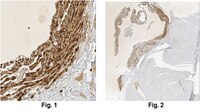MABC1032 Sigma-AldrichAnti-Pro-Atrial Natriuretic Peptide Antibody, clone 11E3.9
This Anti-Pro-Atrial Natriuretic Peptide Antibody, clone 11E3.9 is validated for use in Western Blotting and Immunohistochemistry (Paraffin) for the detection of Pro-Atrial Natriuretic Peptide.
More>> This Anti-Pro-Atrial Natriuretic Peptide Antibody, clone 11E3.9 is validated for use in Western Blotting and Immunohistochemistry (Paraffin) for the detection of Pro-Atrial Natriuretic Peptide. Less<<Recommended Products
Overview
| Replacement Information |
|---|
Key Spec Table
| Species Reactivity | Key Applications | Host | Format | Antibody Type |
|---|---|---|---|---|
| R, H | WB, IH(P) | M | Purified | Monoclonal Antibody |
| References |
|---|
| Product Information | |
|---|---|
| Format | Purified |
| Presentation | Purified mouse monoclonal IgG1κ antibody in buffer containing 0.1 M Tris-Glycine (pH 7.4), 150 mM NaCl with 0.05% sodium azide. |
| Quality Level | MQ100 |
| Physicochemical Information |
|---|
| Dimensions |
|---|
| Materials Information |
|---|
| Toxicological Information |
|---|
| Safety Information according to GHS |
|---|
| Safety Information |
|---|
| Storage and Shipping Information | |
|---|---|
| Storage Conditions | Stable for 1 year at 2-8°C from date of receipt. |
| Packaging Information | |
|---|---|
| Material Size | 100 μg |
| Transport Information |
|---|
| Supplemental Information |
|---|
| Specifications |
|---|
| Global Trade Item Number | |
|---|---|
| Catalogue Number | GTIN |
| MABC1032 | 04055977288292 |
Documentation
Anti-Pro-Atrial Natriuretic Peptide Antibody, clone 11E3.9 SDS
| Title |
|---|
Anti-Pro-Atrial Natriuretic Peptide Antibody, clone 11E3.9 Certificates of Analysis
| Title | Lot Number |
|---|---|
| Anti-Pro-Atrial Natriuretic Peptide, clone 11E3.9 - 3455541 | 3455541 |
| Anti-Pro-Atrial Natriuretic Peptide, clone 11E3.9 -Q2606844 | Q2606844 |
Brochure
| Title |
|---|
| New Products Flyer- Vol 4 Signaling Feature- NEW! Phosphohistidine Antibody |
Posters
| Title |
|---|
| Post-Translational Modifications |









